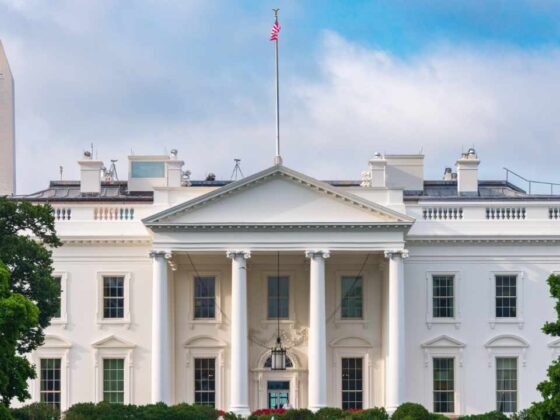Governments worldwide have a long and storied history of directing capital flows to and within private markets to meet public policy objectives. But encouraging private capital is preferable.
When generous tax breaks are awarded to wealthy investors and capital commitments are made to subpar fund managers, public accountability requirements and performance targets are rarely met.
At the extreme, state capitalism rests control of capital flows with the state. The state chooses the winners, full stop. This is antithetical to the principles of free markets and private enterprise. Yet, Western democracies have adopted a hybrid version of state capitalism since the Great Depression.
Origins of Modern State Intervention
Modern state intervention can be traced back to Franklin Delano Roosevelt’s New Deal, which launched with unemployment relief programs and then progressed to investments in public works and infrastructure.
Across the Atlantic, the UK government in 1931 explored the economic and social impact of the Great Depression by forming the Committee on Finance and Industry. Chaired by Lord Macmillan, the Committee identified a chronic shortage — dubbed the Macmillan gap — of long-term investment capital for small- and medium-sized enterprises (SMEs).
Immediately after World War II, the Industrial and Commercial Finance Corporation was created. It would later be renamed Investors in Industry, or 3i Group, which listed on the London Stock Exchange 30 years ago.
The US Government launched the Small Business Administration (SBA) in 1953 to support entrepreneurs and small businesses by providing low-interest loans.
State subsidies often make the headlines when federal governments or individual states offer incentives for large corporations to base their headquarters or manufacturing facilities within their borders. One well-known example is the $5 billion government support for Elon Musk’s companies — including Tesla and SpaceX. This support included commercial contracts, grants, loans, and tax breaks.
Subsidies to smaller market participants, particularly in the private sector, are easily overlooked. They are often channeled through universities in the form of research grants. There is a growing ecosystem of science parks that includes a combination of universities, research institutes, incubators, and start-ups.
Although some of these innovation centers are private initiatives, such as Xerox’s Palo Alto Research Center, many were born out of government initiatives.
Examples include the Research Triangle Park in North Carolina, which saw the light in 1959, Sophia Antipolis in southern France launched 10 years later, followed by the Cambridge Science Park in the UK in 1970.
This formula has been adopted around the world. Daedeok Innopolis in South Korea, and China’s Zhanjiang Hi-Tech in Shanghai are among the world’s largest clusters.

Governments often use two economic tools — agencies and subsidies — as part of a policy remit to oversee strategic sectors and promote emerging industries. Railroads, telecoms, and aircraft manufacturing have benefited from these policies historically.
But in recent decades, particularly in the wake of the global financial crisis (GFC), governments have expanded investment policies to encompass practically all sectors of the economy.
Sovereign wealth funds are the most wide-reaching tools. Although their investments are not restricted to private markets, several — including Singapore’s GIC and Abu Dhabi’s ADIA — have long been active contributors to private equity (PE), real estate, infrastructure, and private credit funds. Norway’s sovereign wealth fund is a well-known exception, taking a negative stance on PE.

State Banks and Investment Funds
Other instruments applied by governments to influence private markets are more recent additions. In most cases, the GFC triggered their implementation.
In the UK, Prime Minister Gordon Brown and his successor David Cameron commissioned a report from Chris Rowlands, a former senior executive at 3i Group, to investigate a likely “funding gap” in the small- and medium-sized enterprises (SME) segment. Rowlands duly identified a capital shortage, even though the UK has the largest supply of private capital in proportion to its economy among European countries.
The “need” led to the launch of several new entities that, over the following decade, flooded private markets with capital.
The Business Growth Fund (BGF), the British Business Bank (BBB), the Enterprise Capital Funds (ECFs), and other programs saw the light and have been operating ever since. Their performance is far from impressive and their reporting is opaque.
Several major European economies adopted similar approaches. France’s Banque Publique d’Investissement (BPI) and Italy’s Fondo Strategico Italiano (FSI) launched at about the same time. BPI France and BGF frequently top the league tables of dealmakers in Europe. And an Irish government agency turned out to be the most active investor in European VC last year.
In truth, European governments have always been far more interventionist than the United States. The Netherlands emulated the Macmillan initiative when it launched NPM Capital in 1948, for instance. And during the dotcom bubble, the French State launched the Fonds National d’Amorçage (FNA) to support fund managers sponsoring early-stage enterprises. Post-GFC, the FNA was reintroduced, reportedly as a one-off. However, yet another vintage was launched in 2016.
Perhaps nothing encapsulates more the French State’s love-in with market intervention than the fact that BPI’s parent company is the Caisse des Dépôts et consignations, the country’s investment arm enacted under Louis XVIII in 1816.
The European Investment Bank and the European Investment Fund were established to commit capital to venture and buyout funds as well as to take equity stakes in, and provide loans to, private enterprises across the continent. Their establishment was a natural evolution of state intervention in private markets.
Tax Credits and Avoidance Schemes
Complementing this panoply of government programs, tax credits were instituted to encourage research and development in technology. These credits have been extended to cover all capital injections that support young and innovative enterprises, often but not exclusively in the tech sector.
In the United States, university endowment funds and ultra-high-net-worth individuals who can set up foundations receive tax incentive to reinvest part of their accumulated capital back into the economy. These are government-sponsored tax avoidance schemes.
In Europe, such schemes took a different path. Since the 1990s, successive UK governments have prioritized investments by individual investors. Venture capital trusts (VCT), enterprise investment schemes (EIS), and seed-enterprise investment schemes (SEIS) offer between 30% and 50% tax credits on capital gains, as well as fully tax-deductible capital losses for individuals backing innovative start-ups or venture fund managers.
France has introduced similar investment products — including FCPI, or Fonds communs de placement dans l’innovation — for taxpayers committing capital to fund managers focused on early-stage enterprises.
These tax-avoidance products operate without a guaranteed hurdle rate, or performance target, for prospective investors. It means that their investment criteria are a lot looser than those of more professionally run PE and VC firms.
VCT and FCPI fund managers do not need to concern themselves with meeting a target rate of return either. In the end, governments — more precisely, taxpayers — foot the bill for all the tax credits granted to investors in these schemes and for accumulated capital losses.
Market Intervention or Manipulation?
Government involvement in private investment initiatives raises concerns about mismanagement, bloated payrolls, and corruption. Other side effects include capital overhang, underperformance, and market disruption.
State banks, state-sponsored funds, and tax-avoidance investment schemes operate without target investment rates of return in mind. Performance seems secondary to creating jobs and propping up targeted segments of the economy.
Instead of encouraging private fund managers, many governments have resolved that asset management, start-up financing, leveraged buyouts, real estate development, and other investment activities are central to public economic policies.
Relentless supply of state-backed vehicles and tax-avoidance schemes means that many subpar businesses can operate. The negative effects of these initiatives are far reaching.
By interfering with free markets, bureaucrats hurt viable businesses that could themselves be hiring more people if it wasn’t for the unfair competition emanating from government-backed participants.
Crowding-out is also taking place in the asset management industry. Private fund managers are being priced out of lucrative transactions by state-sponsored venture funds like BGF and BPI in France, as well as tax-avoidance investment vehicles like VCTs and FCPIs.
More insidiously, taxpayer money is being diverted away from genuine government functions like education, healthcare, pensions, policing, and housing.
Funding Gaps Galore
Another issue with state intervention is that it can get addictive. The Macmillan review led to a capital injection to rebuild the UK economy. This was justified given the destructive impact of the war and the limited resources of the private sector at the time. But when David Cameron’s government followed the same path in the aftermath of the GFC, the UK had one of the world’s largest private capital sectors in proportion to its economy.
UK Prime Minister Boris Johnson commissioned a strategic review in 2021 of fintech — a sector considered crucial to the country’s tech ambitions — that once again led to the identification of a “funding gap.” In response, yet another government-sponsored investment platform: the Fintech Growth Fund (FGF), was launched last summer.
The FGF is chaired by former Chancellor of the Exchequer, Philip Hammond, who tried actively to secure funding from the UK Treasury, the department he used to run between 2016 and 2019. The FGF has already received the backing of several financial institutions.
Governments relish mingling in markets. Yet, if past policies are any guide, taxpayers are being shortchanged.
If you liked this post, don’t forget to subscribe to Enterprising Investor.
All posts are the opinion of the author. As such, they should not be construed as investment advice, nor do the opinions expressed necessarily reflect the views of CFA Institute or the author’s employer.
Image courtesy of Nick Webb. This file is licensed under the Creative Commons Attribution 2.0 Generic license. Cropped.













